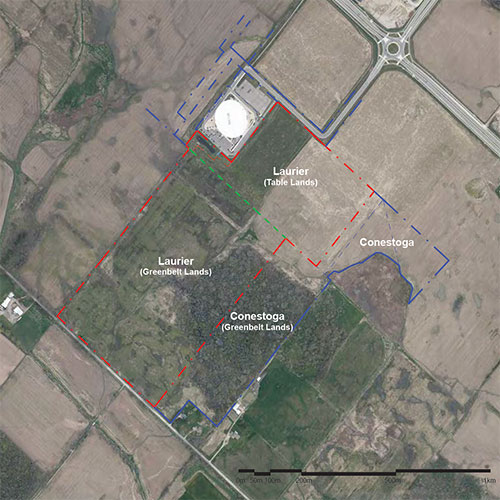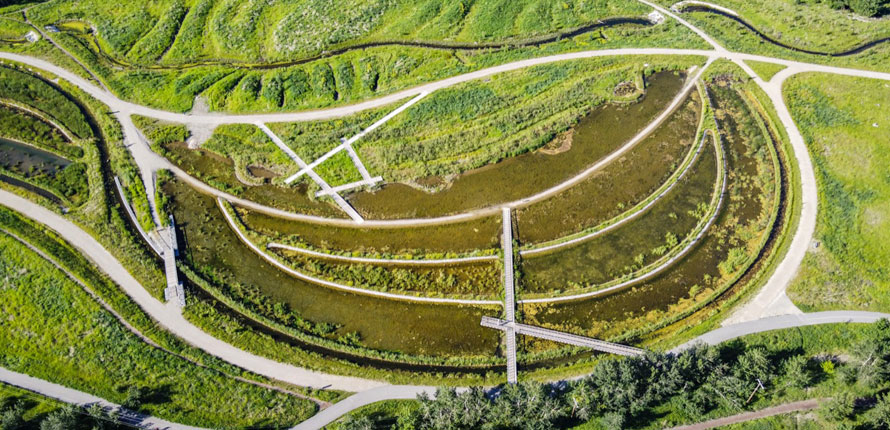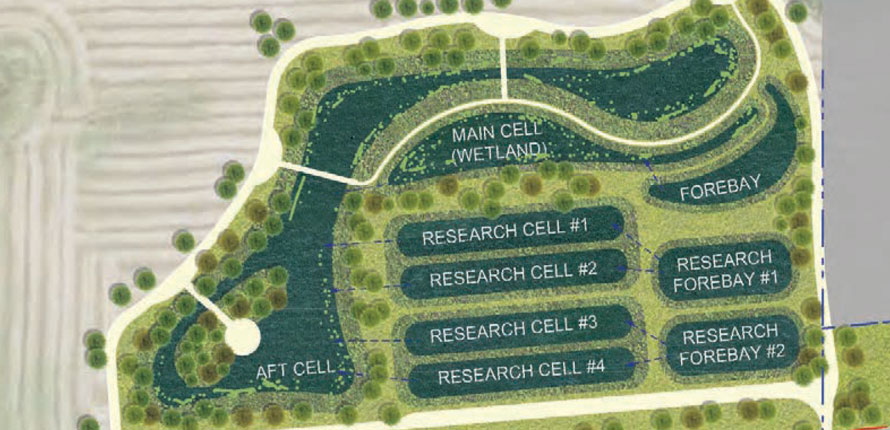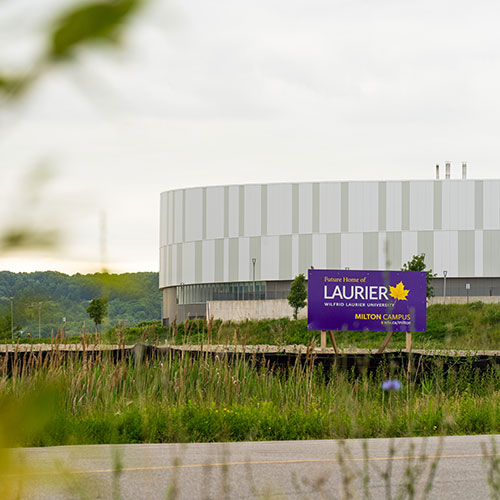Search for academic programs, residence, tours and events and more.
Wilfrid Laurier University welcomed its first class of students to the Milton campus in September 2024, extending the university's high-quality academic and student experience along the Toronto-Waterloo Innovation Corridor to the fast-growing community of Milton.
The early years of the Laurier Milton campus experience are set in the Laurier Milton Academic Centre's engaging education hub, tailored to local and commuter students from the Halton Region and the Greater Toronto Area looking to attend university close to home.
Over time, thousands of students, faculty and community partners will work at the forefront of research, innovation and entrepreneurship in Milton. Focused on solutions to planetary health challenges and urban watershed research, their ideas will extend from a broad suite of programs in the classroom into the surrounding greenbelt’s living laboratory. From there, co-op opportunities and partnerships will connect higher-education talent and expertise with Milton business and industry.

We are actively developing Laurier’s Milton campus, which will evolve over the years into a robust, purpose-built campus in the Milton Education Village. Campus spaces will come to life, grounded by Indigenous principles of land stewardship and enriched by sustainable buildings.
Note: The timeline is subject to change based on regulatory approvals.
June 2021
Government of Ontario approval.
July 2021 – February 2023
Master planning, design and approvals.
Spring/Summer 2023
Computer Science and Psychology approved as first programs. Planning and site work continues.
Fall 2023
Laurier, Town of Milton, Haltech and Conestoga College form the Milton Innovation Collective.
Fall 2024
Laurier welcomed the first class of Milton students to the Laurier Milton Academic Centre.
Fall/Winter 2024-25
Approved Business Technology Management (fall 2025). Approved Software Engineering (fall 2026).
Spring/Summer 2025
Laurier Milton Academic Centre phase two renovations.
Laurier Milton is currently located in the Laurier Milton Academic Centre, an engaging education hub at 555 Industrial Drive.
The campus will develop in multiple phases over the years on land provided by the Town of Milton – part of the planned Milton Education Village in west Milton, alongside the Niagara Escarpment.
The land contains developable greenfield table lands and low-lying wetland and woodland Greenbelt Lands.
As the physical campus develops over the years, well-connected open spaces and buildings will create a living laboratory that fosters hands-on learning, research, and wellbeing for students, staff, faculty, and the broader community.
The campus will weave throughout the surrounding natural ecosystem, allowing learning and ideas to flow from the classroom to the lab and into the natural landscape.


As it evolves, Laurier’s future Milton campus will be lively, safe, accessible and inclusive, promoting wellbeing and fostering personal and community connections.
The campus will promote learning, socializing and experiencing nature, and will focus on sustainability and planetary health through state-of-the-art technology and a minimum zero-carbon footprint.
Campus spaces will be accessible and inclusive of all learners, with spaces and technology that can be reconfigured to suit a range of pedagogical approaches to adapt spaces to users’ changing needs.
The campus design and programming will adopt Indigenous worldviews and be rooted in Indigenous principles of land stewardship and placekeeping, along with Indigenous pedagogies and ways of knowing, such as circle and land pedagogy.
Laurier is developing its Milton programming, research and experiential learning with an emphasis on STEAM (science, technology, engineering, arts and mathematics) under a planetary health umbrella, which looks at the intersection between human and environmental health.
As the campus evolves over time, it will be adjacent to Greenbelt lands and the Niagara Escarpment and connect with the neighbouring urban environment.
Once developed, this unique academic environment will foster new developments in clean and green technology, sustainable development and more through academic programming, a living lab, knowledge mobilization and commercialization of planetary health solutions.
Inaugural Laurier Milton programs include Computer Science and Psychology, and elective courses in User Experience Design, Leadership and Criminology.
Laurier’s Business Technology Management program started in September 2025, and Software Engineering will start in September 2026.
Programs are delivered in cohorts to maximize students’ in-person and remote experiences and include amenities that provide students with an on-campus experience tailored to their specific needs.
Laurier’s Milton campus will be research-intensive, with a multi-disciplinary approach committed to excellence and a focus on solving local, regional, national, and global environmental challenges under a planetary health umbrella. Research activity at the campus will focus on the Greenbelt and Niagara Escarpment lands as a living laboratory for students and collaborative research partnerships with industry.
With partnership as a pillar of our development, the campus and its programs will be a significant element of a Milton hub for sustainable, purpose-led innovation and entrepreneurship.
Laurier’s Milton campus will ensure strong linkages among businesses, the community and the university, creating a focal point for economic activity and research and innovation with numerous experiential learning opportunities for students, such as co-op placements, volunteer opportunities, workplace projects and community service-learning.


For more Laurier news and stories, visit wlu.ca/news.
As Laurier works to bring its Milton campus to life, we are pleased to share event and development photos.
